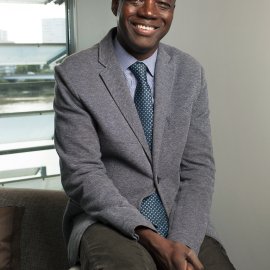Anthropology, Fordham University, United States and Bamako University, Mali

Octobre 2018 à Juin 2019
Isaïe Dougnon received his Ph.D. in Anthropology from the University of Bayreuth in 2003. From 2003 to 2017 he taught at the University of Bamako. From 2017 he took a position as Assistant Professor of Francophone Humanitarian Studies at Fordham University (New York). His first book, Travail de Blanc, Travail de Noir (Karthala, 2007) examines the concept of work among Dogon immigrants to the Office du Niger (Mali) and Ghana. Based on this ethnography, Mr. Dougnon has contributed to current debates on child labour in Africa. Since 2009, he has moved from the study of the local life cycle pattern among migrants to the study of the institutionalized life cycle pattern among the educated elite, through which he has completed a book manuscript. Mr. Dougnon has held many fellowships, including at the Humboldt Foundation, Re:Work (Humboldt University, Berlin), and the Fulbright Foundation. Through his current work on academic freedom in Mali he hopes to contribute to the improvement of scientific research and democratic institutions in the Global South. His work has appeared in many journals and edited collections, including Humanity, African Economic History, African Identities, and Hommes & Migrations.
The crisis of academic freedom before and after democracy: Student and professor resistance, syndicalism and radicalism in Malian higher education
This project explores the dynamics of the crisis of academic freedom in Mali during a pivotal period in the country’s history: the transition from a dictatorship to a democracy, and the effects that these political changes continue to have on intellectual life. In 1968, the first president of Mali, Modibo Keita, was overthrown by a military junta. For the intellectual class, the euphoria of their newly acquired freedom quickly dissipated. Pan-Africanist ideals and the general awakening of political consciousness gave way to constant rivalries between academics and the junta. The political resistance of intellectuals penetrated secondary and higher education during the dictatorship. Today, academics often remain silent on key issues concerning the Malian crisis and focus instead on improving their personal status and conditions. How did this happen? As both Jürgen Habermas and Noam Chomsky have observed, the structural relations between education and politics provide a way of understanding the struggle of students and professors for their civic and political rights both in society and at the university. This project will investigate why higher education in Mali has become a space for consensus politics instead of lively intellectual debate. Why did the fall of dictatorship and the installation of democratic rule in the 1990s paradoxically lead to the erosion of academic freedom instead of its flourishing?
DOUGNON, Isaie. '"Travail de Blanc",''Travail de Noir" : la migration des paysans dogons vers l’Office du Niger et au Ghana 1910-1980, Paris, Karthala, 2007, 289 p.
DOUGNON, Isaie. “From Dictatorship to Democracy: Nature and Evolution of Academic Freedom in Mali”, in Abdalla Bubtana (ed.) Academic Freedom: problems and Challenges in Arab and African Countries, France United Nations Educational Scientific and Cultural Organization, 2006, pp. 17-30.
DOUGNON, Isaie. “Reinterpreting Labor Migration As Initiation Rite: ‘Ghana Boys’ and European Clothing in Dogon Country (Mali) 1920-1960”, African Economic History, 2016, Vol. 44, 73-90.
DOUGNON, Isaie. “Les élites, les masses populaires et les forces armées: changement politique et conflits en Afrique au Sud du Sahara », In Klute Georg & Birgit Embalo, The Problem of Violence : Local Conflict Settlement in Contemporary Africa. Köln: Rüdiger Köppe Verlag , 2012, pp 71-92.
DOUGNON, Isaie. “Child Trafficking or Labor Migration? An Historical Perspective from Dogon Country” Humanity, An International Journal of Human Rights, Humanitarianism, and Development, 2011,2(1):85-105.